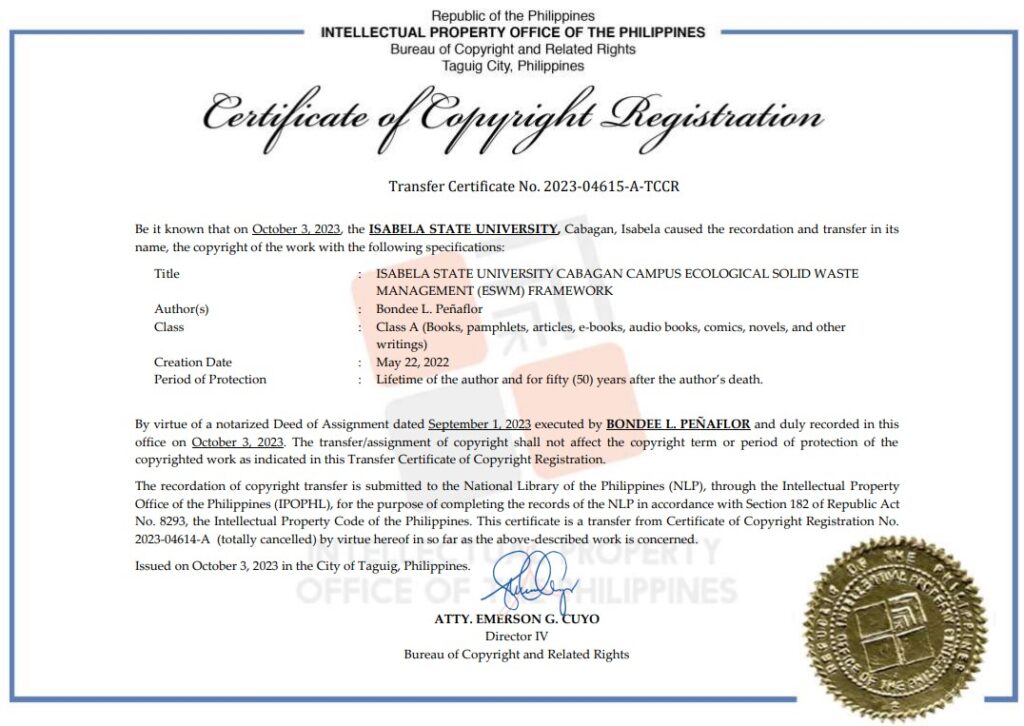2022 – Reports | SDG 15 – Life on Land

Conservation and sustainable utilization of the land
Isabela State University inked a strong partnership with the Department of Environment and Natural Resources (DENR) for the commissioning of Environment and Natural Resources (ENR) Ambassadors which comprise of selected ISU students. Several activities have been organized by ISU and DENR with regard to the implementation of various ENR-related activities and programs such as, but not limited to Bamboo Planting held on June 8, 2022 and Conduct of Kampo Kabataan para sa Kalikasan (Environmental Youth Camp) held on May 17-19, 2022.
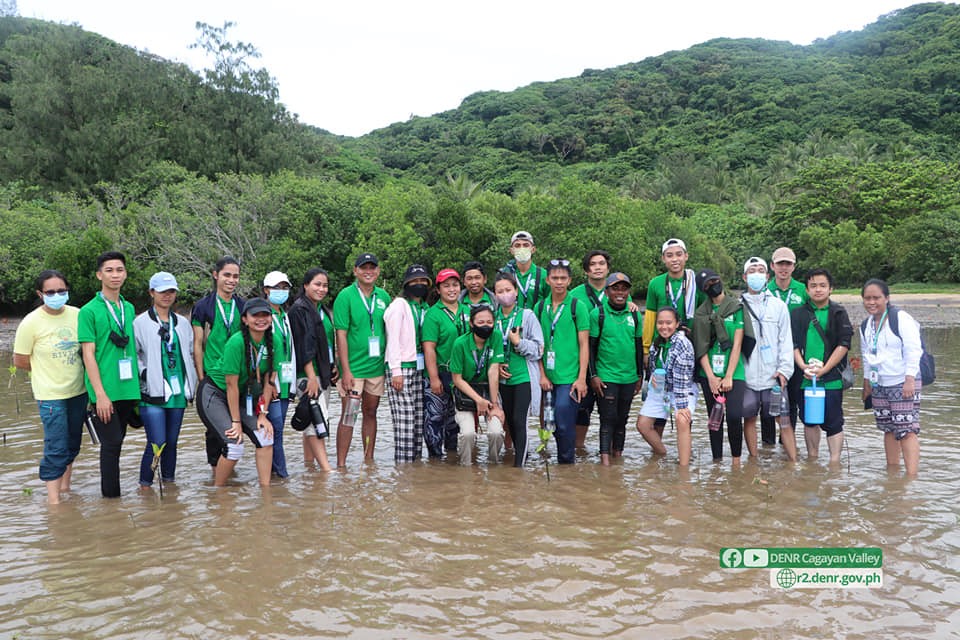
The ambassadors from Isabela State University and other schools were equipped with knowledge on basic ENR laws and coastal and marine ecosystems and management and engaged with the coastal clean-up at Palaui Island Protected Landscape and Seascape (PIPLS). They also conducted tree identification at the forest and mangrove areas in PIPLS and were exposed to seagrass to appreciate the interconnectedness of forest and marine ecosystems.
The University launched the Philippine Crocodile Conservation Center (PCCC) on April 19, 2022, at ISU-San Mariano Campus to ensure nature stability, species survival for biodiversity protection, and people’s cognizance of sustainable development. It is an offshoot of a Tripartite Memorandum of Agreement of the Local Government Unit of San Mariano, the Mabuwaya, Inc. and the Isabela State University, with the support of the Department of Environment and Natural Resources (DENR) and the Department of Tourism (DOT). Consequently, the local executives conveyed their profound gratitude to the University’s continuous academic and economic efforts in bringing forth campus advancement in terms of wildlife conservation. With the establishment of the Philippine Crocodile Conservation Center in the campus, the University exudes and epitomizes its love and commitment to nature and wildlife species therein, which is enshrined in its advocacy as a University for People, Nature, Entrepreneurship, and Innovation. To further promote its advocacies, the Development Communication students of ISU-Cabagan collaborated with the Mabuwaya Foundation, Local Government Unit–San Mariano, and ISU–San Mariano to convene wildlife conservation enthusiasts who will visit the Philippine Crocodile Conservation Center. This joint endeavor aimed to encourage large-scale participation of the community towards Philippine crocodile and biodiversity conservation in Northeast Luzon. As the project is expected to trailblaze in the province and beyond, all its planned endeavors are considered pioneering work in wildlife conservation.
Educational programmes on ecosystems for local or national communities
The University is offering Bachelor of Science in Forestry (BSF), Bachelor of Science in Environmental Science (BSES), Bachelor of Science in Agriculture (BSA), and other related programs that addresses concerns on local or national ecosystems. These various curricular programs have been offered in the University supported by the approval of ISU Board of Regents and the issuance of Certificate of Program Compliance (COPC) by the Commission on Higher Education (CHED) in the Philippines. Aside from these academic programs, several research and extension activities were conducted in relation to sustainable management of land for agriculture, natural resources and tourism.
Sustainable Management of Land for Agriculture and Tourism (Educational Outreach) and Collaboration for Shared Land Ecosystems
The Isabela State University College of Forestry and Environmental Management, through its linkage with Mabuwaya Foundation Incorporated (MFI), an internationally recognized non-government organization, and in cooperation with BLGU Sta. Margarita, conducted a two-day Agroforestry Farm Development Planning Workshop in Sta. Margarita, Baggao, Cagayan on September 3-4, 2022. The training participants were upland farmer-beneficiaries from Baggao, Cagayan who were involved in agroforestry project activities.
Educational programme/outreach for local or national communities on sustainable management of land for agriculture and tourism
In partnership with Mabuwaya Foundation Incorporated (MFI), an internationally recognized non-government organization, ISU College of Forestry and Environmental Management (CFEM) had conducted training workshop on Agroforestry participated by selected farmer-beneficiaries from the Municipality of Baggao in the province of Cagayan.

Policy to ensure the conservation, restoration and sustainable use of terrestrial ecosystems and identification, monitoring and protection of any IUCN Red Listed species
ISU Cabagan Campus as a Wildlife Sanctuary. ISU Cabagan campus was declared as a wildlife sanctuary due to the unique ecosystem landscape over the campus which harbors dense vegetation cover that serve as a habitat of various fauna that are strictly protected.
The University management identified the niche of every campus. Relative to the conservation, restoration and sustainable use of terrestrial ecosystems particularly on forests, mountains and drylands, the Isabela State University-College of Forestry and Environmental Management (ISU-CFEM) of Cabagan campus spearheaded these activities while the other campuses are also doing their respective roles. In addition, some research centers like the Cagayan valley Program on environment and Development (CVPED), Upland Resource Center (URDC), etc. were crafted to address these issues. CVPED started in 1988 with strong collaboration and partnership between ISU-CFEM and Leiden University, Netherlands. Dutch students went to ISU-CFEM to conduct their research for the completion of their respective MS and PhD degree programs towards the sustainable conservation and management of the Northern Sierra Madre Mountain range.
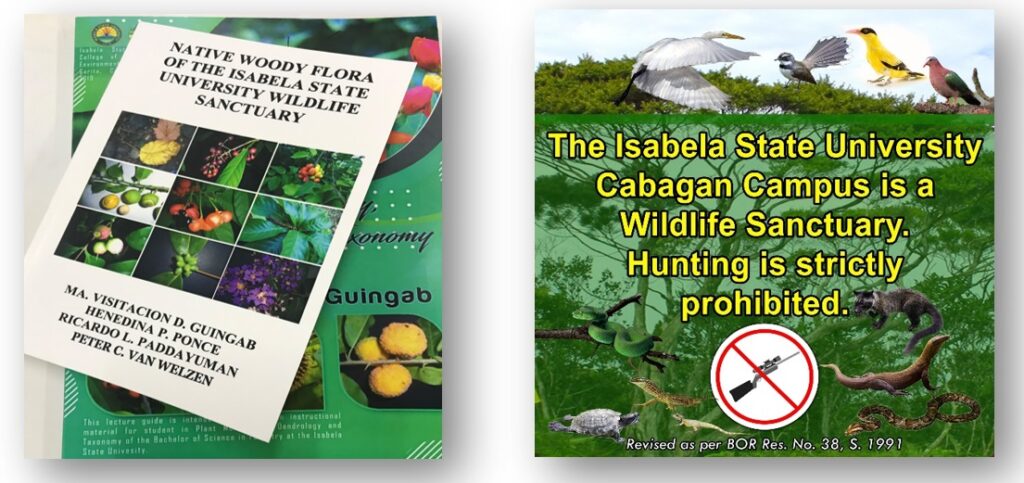
Collaboration with the local community to maintain shared land ecosystems
The University has its RDET unit to reach the grassroots. ISU Cabagan campus, in partnership with the Department of Environment and Natural Resources and various Local Government Units (LGUs), shared the responsibility for the sustainable conservation and management of the Balasig watershed and the Northern Sierra Madre Natural Park (NSMNP).
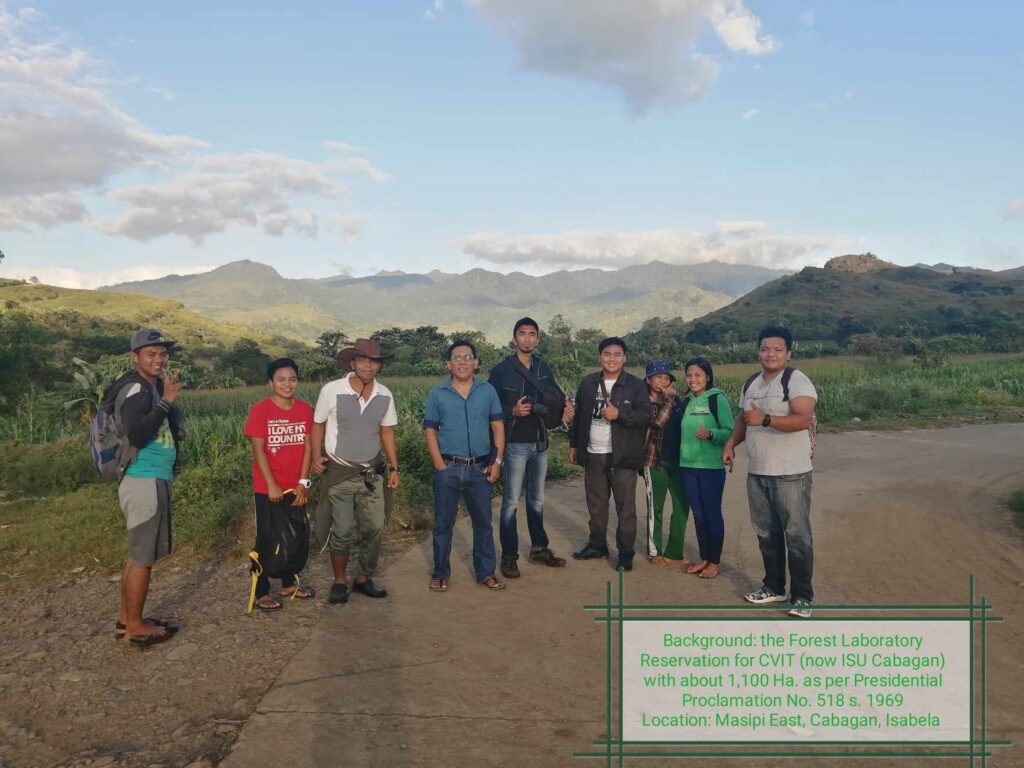
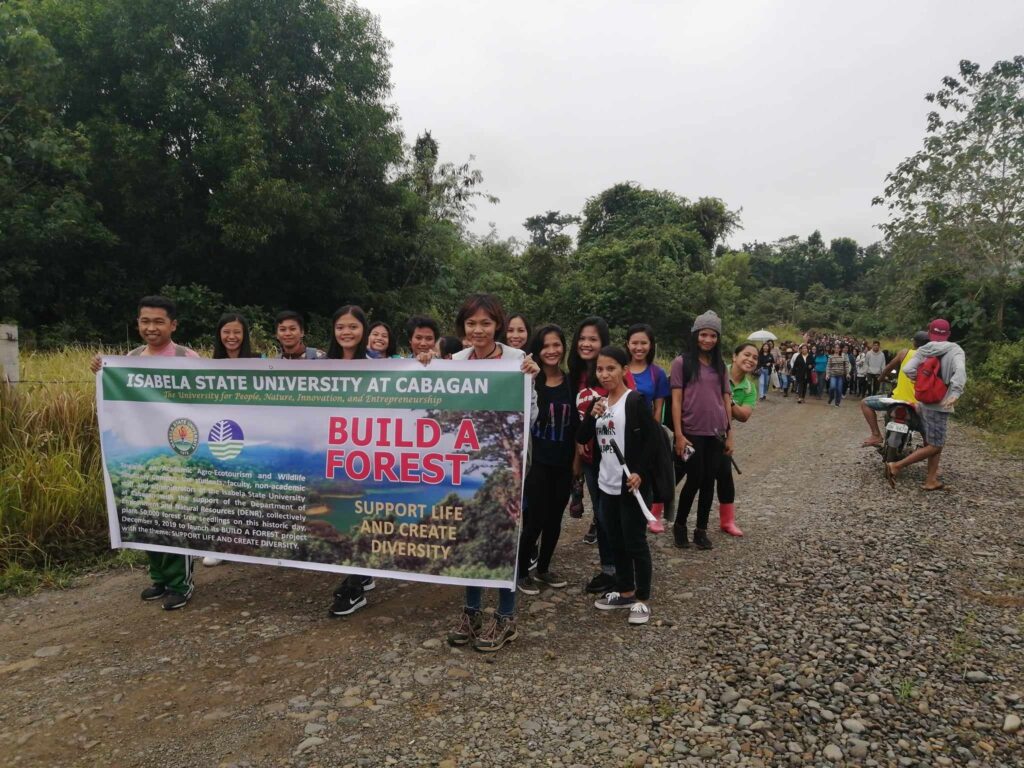
Monitoring of IUCN and Other Conservation Species (Policies)
Responsive to the promotion of species conservation, ISU Cabagan Campus was declared as a wildlife sanctuary due to the unique ecosystem landscape over the campus which harbors dense vegetation cover that serves as a habitat of various fauna that are strictly protected.
Land sensitive waste disposal
ISU Cabagan Campus has an approved Environmental Management Code (EMC). The objectives of the EMC are the following: (1) Initiate and nurture the value of environmental sustainability among students, faculty and staff, including private residents within the campus; (2) Contain and manage campus wastes generated within its premises, practice reduce, re-use and re-cycling of waste and residuals be disposed ecologically; (3) Have a healthy working environment by strict implementation of the no smoking, no burning, no littering, no urinating elsewhere, and no beetle nut spitting policies in the campus; and (4) Establish a model sustainable environmental management program in the province.
Responsive to the concerns related to solid waste management, the University has actively focused on the development and compliance with such policies and regulations, thereby supporting the mandate of the national government stipulated in Article II, Section 16 of the Philippine Constitution which states that “The State shall protect and advance the right of the people to a balanced and healthful ecology in accord with the rhythm and harmony of nature.”
Moreover, the University is always committed to securing its local populace from the threats that solid waste mismanagement could bring and create a healthy and safe environment for its constituents. As a result, the University crafted a five-year plan integrating strict adherence to the aforementioned mandate and/or in accordance with the national and even local laws particularly RA 9003. With a steadfast commitment to environmental sustainability, the University will rigorously enforce the implementation of Environmental Solid Waste Management (ESWM) practices. By doing so, it aspires to create an idyllic living environment, entirely devoid of pollution.
ISU Cabagan Campus has an approved Ecological Solid Waste Management Plan (ESWMP). At present, the existing management scheme on solid wastes in Isabela State University Cabagan (ISUC) Campus is not yet fully established. The existing solid waste management initiatives of the campus are discussed in this plan. However, there are constraints in its implementation and the operations that are taking place in the campus.
To this end, ISUC has directed its attention at complying into policies and/or regulations about the concerns on solid wastes. This is to secure its local populace from the menace that the problem on solid wastes could bring forth. Moreover, this is in support to the mandate of the government as stipulated in Article II, Section 16, of the Philippine Constitution which states that “The State shall protect and advance the right of the people to a balanced and healthful ecology in accord with the rhythm and harmony of nature.”
In so doing, ISUC, with its aim at providing a healthy and safe environment for its constituents, responded and took the challenge of crafting this 5-year plan that shall serve as a guide in strictly adhering to the mandates in accordance with the national (and even local) laws particularly RA 9003. This will ensure that ESWM will be implemented in the Campus so that it will become an ideal place to live in that is free from any source of pollution.
The Isabela State University–Cabagan Campus asserts exclusive copyright over its methodically crafted Ecological Solid Waste Management (ESWM) Overall Framework. Essentially, this comprehensive Ecological Solid Waste Management Program intends to satisfy the requirements set forth by existing laws and to ensure that proper solid waste management is extensively practiced. Specifically, ISU – Cabagan Campus Solid Waste Management Program has five pillars, namely: scientific studies; institutional policies and platforms; centralized materials recovery facility; production of innovative products; and patent, publication, marketing, and extension.
